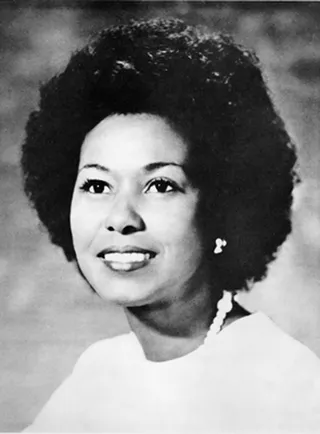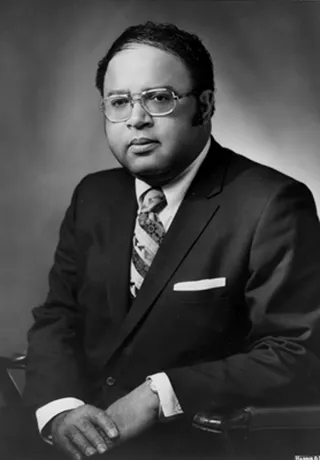November Firsts: African-Americans Who Broke Barriers in Politics
Political stars who set major milestones in November.

1 / 15
Barack Obama - Four years ago, Barack Obama was elected the first Black president, but there are many other Black politicians who blazed a path during the month of November. — Britt Middleton Continuing on his historic path, President Obama was re-elected to serve a second term on Nov. 6. (Photo: DUNAND/AFP/Getty Images)

2 / 15
Shirley Chisholm - Shirley Chisholm was the first Black woman elected to Congress in 1968, representing New York from 1969 until 1983. In 1972, she also became the first major-party Black candidate to run for president and was the first woman to run for the Democratic presidential nomination. (Photo: Don Hogan Charles/New York Times Co./Getty Images)

3 / 15
Colin Powell - A retired four-star army general, Colin Powell was named White House National Security Adviser in 1987. Powell would be appointed the first Black U.S. Secretary of State in 2001, serving under President George W. Bush. (Photo: CHRIS WILKINS/AFP/Getty Images)

4 / 15
Condoleezza Rice - One of the Republican Party's shining stars, Condoleezza Rice was nominated to succeed Powell as U.S. Secretary of State in 2004, the first Black woman to receive the honor. She was confirmed by the U.S. Senate in January 2005, serving under President Bush. (Photo: Brendan Smialowski/Getty Images)

5 / 15
Carol Moseley-Braun - Elected in 1993, Carol Moseley-Braun became the first Black female U.S. senator, representing the state of Illinois until 1999. In her single term in office, she was also the first Black woman to serve on the finance committee and advocated new legislation on crime, education and civil rights. (Photo: BRIAN BAHR/AFP/Getty Images)
ADVERTISEMENT

6 / 15
Louis Stokes - Louis Stokes was the first African-American elected Congressman of Ohio in 1968. He chaired several Congressional committees, including the Permanent Select Intelligence Committee, and was the first African-American to win a seat on the House Appropriations Committee. (Photo: Wikicommons)

7 / 15
Mervyn M. Dymally - In 1974, Mervyn M. Dymally was elected lieutenant governor of California, the first Black person to hold statewide office there. Dymally went on to serve 12 years as a Congressman representing California's 31st district, where he was an advocate for international human rights and economic development in Africa and the Caribbean. (Photo: Wikicommons)

8 / 15
Eva M. Clayton - First rising in the political scene in the 1960s as a civil rights activist, Eva M. Clayton was elected North Carolina's first Black Congresswoman in 1991, where she served until 2003. A member of the House Agriculture Committee, she called attention to economic inequalities affecting African-Americans. (Photo: US Government House of Representatives)

9 / 15
George L. Brown - George L. Brown became the first Black lieutenant governor of Colorado in 1974, the first Black person in that office since the Reconstruction Era, serving until 1979. He previously served in the Colorado Senate from 1955 to 1974. (Photo: Wikicommons)

10 / 15
L. Douglas Wilder - L. Douglas Wilder became the first Black elected governor of Virginia, and the first Black governor in U.S. history, in 1989, holding the position until 1994. From 2005 until 2009, he served as mayor of Richmond. (Photo: Courtesy of the Library of Congress)
ADVERTISEMENT

11 / 15
Edward William Brooke III - Elected in 1966, Edward William Brooke III was the first African-American from Massachusetts to serve in the U.S. Senate and the first Black senator elected since the Reconstruction Era. A moderate Republican, he adopted a liberal stance on social issues, notably defending the implementation of the 1965 Voting Rights Act and fighting for the designation of Martin Luther King Jr.'s birthday as a national holiday. (Photo: Hulton Archive/Getty Images)

12 / 15
Julia May Carson - Julia May Carson was elected Indiana's first Black Congresswoman in 1996, where she served until 2007. Carson called attention to issues affecting children and working-class families and served on the financial services committee, where she authored legislation to reform the debt consolidation industry. (Photo: US Government House of Representatives)

13 / 15
Yvonne Brathwaite Burke - Yvonne Brathwaite Burke's political career included several firsts: she was the first Black female elected to the California assembly in 1966 and the first Black female from California elected to the U.S. House of Representatives in 1972. She also served as the first woman chair of the Congressional Black Caucus. (Photo: US Government House of Representatives)
Photo By Photo: US Government House of Representatives

14 / 15
Charles Coles Diggs Jr. - Charles Coles Diggs Jr. was elected Michigan's first Black congressman in 1954. Diggs was a noted champion of civil rights advocate of increased American aid to Africa. (Photo: Wikicommons)
Photo By Photo: Wikicommons
